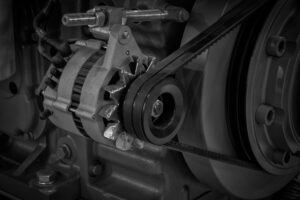A car’s transmission is one of its most critical components. When it begins to fail, it can lead to serious and costly problems. Unfortunately, many drivers don’t recognize the early warning signs. Being proactive about your Ford’s transmission health can save you time, money, and stress. Let’s look at the seven most common signs that your Ford may need a transmission repair.
1. Difficulty Shifting Gears
When your Ford’s transmission starts having trouble, one of the first things you might notice is difficulty shifting between gears. Whether you drive an automatic or a manual transmission, gear shifting should be smooth. If you experience delays, grinding noises, or abrupt jerks when shifting gears, this is a strong indication that something is wrong.
Symptoms of Gear Trouble
This issue may manifest as hesitation when you shift into a new gear or even an inability to shift into certain gears at all. You might also feel the gears slipping out of place. If this happens, it’s essential to seek professional help immediately. These symptoms can quickly worsen if left unchecked, leading to a complete transmission failure.
2. Unusual Noises While Driving
Your Ford’s transmission is designed to operate quietly in the background. However, when it’s failing, it can produce various sounds such as grinding, clunking, or whining. These noises are particularly noticeable when shifting gears or accelerating.
Listen to Your Transmission
If you hear unusual noises that seem to come from your transmission, it’s essential to get it checked. These sounds often signal problems such as worn-out bearings, gears, or low transmission fluid levels. Ignoring them can lead to more serious damage down the road.
3. Transmission Fluid Leaks
Leaking transmission fluid is one of the most obvious signs that something is wrong. Transmission fluid is crucial for the smooth operation of your vehicle’s gears and internal components. Without enough fluid, the transmission can’t function properly and will eventually break down.
What to Look For
Transmission fluid is typically red or pink in color, but it can turn brown as it ages. If you notice spots of this fluid under your Ford, it’s time to visit a mechanic. A leak may be the result of a broken seal or gasket, and while it may seem like a minor issue at first, it can quickly escalate into something far more expensive if ignored.
4. Warning Lights on Your Dashboard
Modern Ford vehicles are equipped with sensors that monitor various systems, including the transmission. If there’s an issue, the check engine light or another warning light may illuminate on your dashboard.
Pay Attention to Dashboard Alerts
While a warning light alone doesn’t always mean you need a transmission repair, it’s an indication that something isn’t right. It’s essential to have a professional check out your vehicle as soon as possible to avoid further complications. Sometimes, these lights can be triggered by minor issues, but they could also indicate a larger transmission problem.
5. Burning Smell
A burning smell coming from your Ford is never a good sign, and it can be especially concerning if it’s related to the transmission. This smell may be caused by the transmission fluid overheating, which can occur when the fluid levels are too low or when the transmission is working harder than it should.
Don’t Ignore a Burning Odor
If you catch even a faint smell of something burning, it’s crucial to investigate the issue. Continuing to drive with an overheated transmission can cause significant internal damage, which will likely require a costly repair.
6. Delayed or Sluggish Acceleration
If your Ford seems sluggish or hesitant when you press the gas pedal, it could be due to transmission issues. When the transmission isn’t functioning properly, it can cause a delay in power delivery from the engine to the wheels, resulting in poor acceleration.
The Importance of Prompt Action
You may also experience what’s known as “gear slipping,” where the car momentarily loses power. These issues not only make driving frustrating but can also be dangerous, especially in situations where you need quick acceleration. It’s essential to have a mechanic diagnose the problem before it leads to more severe damage.
7. Strange Vibrations or Shaking
If you notice that your Ford starts to vibrate or shake when driving, particularly when accelerating or shifting gears, this can indicate a problem with the transmission. Shaking or vibrating may occur due to worn-out transmission parts or misaligned gears.
Address Vibrations Immediately
Ignoring these vibrations can lead to more significant transmission problems over time. If you feel that your vehicle is shaking unexpectedly, don’t wait—get it inspected by a professional to prevent further damage.
Conclusion

A failing transmission doesn’t always give obvious signs right away, but when it does, acting quickly is key. If you notice any of the symptoms above—whether it’s difficulty shifting gears, strange noises, or leaking fluid—it’s time to schedule a transmission repair. Proactively addressing these issues can help you avoid the headache of an unexpected breakdown and save you from a more costly repair. Contact Legacy Autoworx today to ensure your Ford stays in top condition.




